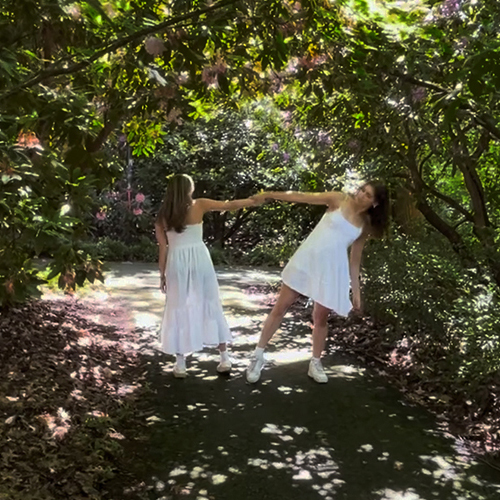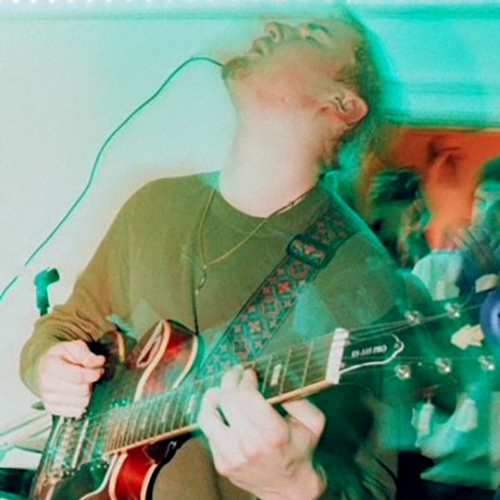When Jeremiah Davis stepped on the stage in She Stoops to Conquer at Meany Studio Theatre, there was one thing he knew for sure: Therese Barnette would be in the audience.
Davis is a third-year student in the School of Drama’s Professional Actor Training Program (PATP). Barnette “adopted” him this year through the School’s Adopt an Actor program. Donors to the program are paired with an actor entering his or her
final year of PATP.

Many donors, like Barnette, take a personal interest in their adoptees, attend ing their performances and staying in touch via phone calls or email. Others choose to maintain more distance. Either way, their gifts through Adopt an Actor help fund the School of Drama’s Showcase Audition Tour. The tour presents PATP graduates to casting agents, directors, and managers in the theatre, film, and television industries in New York and Los Angeles.
“The Showcase Tour is the culmination of everything we’ve done here,” says Davis. “It is the agent that propels PATP graduates into a potential career in acting.”
When the Adopt an Actor program was introduced six years ago, there was just one giving level: $3,500. Now there are more options. Groups of donors can pool their resources to adopt a student, or donors can fund a partial adoption. The goal, says Danny Geiger, development director for the School of Drama, is to make the program accessible to all who are interested.
“This approach has brought a broader base of donors,” says Geiger, who notes
that every PATP student was adopted this year. “For the students, it has been more satisfying because now their friends can participate and support their efforts. There are wonderful relationships that develop, and not just at the elite giving levels.”
For Barnette, who began adopting actors four years ago, the program adds a personal dimension to her giving. “I’ve always been very passionate about supporting young talent embarking on their professional careers,” says Barnette, whose own academic background is in theater. “The students’ progress and growth are a great joy to observe.”
Barnette’s first adoptee was Masha Borovikova. Borovikova had interviewed Barnette — who is from Switzerland — as part of a course about accents, and the two hit it off. So when Barnette had the opportunity to adopt an actor, it felt right to pair up with Borovikova. The relationship continued to grow, with Borovikova inviting Barnette to rehearsals and Barnette inviting Borovikova to dinners. Four years later, the two remain close. Last Thanksgiving, Barnette and her husband celebrated Thanksgiving with Borovikova and her spouse (Garrett Feek, another PATP alumnus) and his family.

“The relationship has evolved way beyond Adopt an Actor,” says Borovikova. “I feel very close to Therese. She’s a sweet, incredibly intelligent person. When she came to my plays, it was always great to talk with her afterward. She always has interesting things to say.”
Ellen Hazzard and her first adoptee had a similar experience. Hazzard had been immersed in drama for years as a volunteer and donor before hearing about Adopt
an Actor from a friend. She thought it sounded like an intriguing way to contribute, but she had no idea what to expect when she was assigned adoptee Adam Larmer (now Adam Noble).
“The first time you meet, you wonder, ‘What is this going to be?’” recalls Hazzard. “I didn’t want him to feel like I was intruding in his world.” She needn’t have worried. Noble welcomed Hazzard’s interest in his acting and soon became a friend. Hazzard eventually met Noble’s parents and girlfriend, and later attended his wedding.
Even before meeting Hazzard, Noble was impressed that she was interested in participating in the program. “When I heard about Adopt an Actor, I thought it was great that people would be willing to establish a relationship with an actor they didn’t know at all or only through productions,” says Noble, now an assistant professor of theatre and drama at University of Indiana. “I thought that was pretty brave.”
Noble started the year by writing Hazzard a thank you note — something expected of all adoptees — and inviting her to a performance. The friendship developed from there. Hazzard attended all of Noble’s plays at the UW and has continued to attend his performances, and those of later adoptees, in Seattle and elsewhere.

Not all adoptive relationships result in such strong connections. While Masha Borovikova developed a rich friendship with donor Therese Barnette, Borovikova’s husband got no response after sending a thank you note to his donor. “My husband appreciated being adopted, but it was fine with him that the donor didn’t respond,” says Borovikova. “He didn’t take it personally. The way we look at it, the donor may not have been interested in a relationship with an individual student but still believed in the project and everything it stands for. We’re just pleased that he wanted to support the cause.”
Hazzard and Barnette are similarly philosophical about the years when contact with their assigned student has been minimal. Both have experienced such years and insist that, while they can be disappointing, it goes with the territory.
“People are going to respond in different ways,” says Hazzard. “You can’t expect the same response every time. You need to be flexible.”
Geiger says that the School of Drama tries to match students and donors based on personality and expectations. An actor who is introverted may be matched with an out-of-town donor. Actors who have indicated an interest in building a relationship are matched with like-minded donors.
Jeremiah Davis fits the latter category. He says that having Barnette as an adop-
tive parent this year, and knowing that she is in the audience to see him perform, has meant a lot. “All my family and friends are back in Baton Rouge, Louisiana,” says Davis, “but with Therese at the shows, it feels like a family member—someone who cares about me—is there.”
Davis adds that the relationship is beneficial for the donors as well. “The PATP productions become more personal to them,” he says. “They get to see actors develop over time.”
Hazzard couldn’t agree more. From the first time she participated in Adopt an Actor, she was hooked.
“The $3,500 I gave that first year was probably the best $3,500 I have ever given
to anyone or anything,” says Hazzard. “Rarely have other donations given back to me in this way. Sure, you might see your name on a plaque somewhere, but here there’s real feedback from these kids. That’s very special.
More Stories

Dancing Across Campus
For the dance course "Activating Space," students danced in public spaces across the University of Washington's Seattle campus this spring.

Meet Our 2024 Graduate Medalists
Meet the three students selected by the College of Arts & Sciences as 2024 Graduate Medalists for their accomplishments.

Celebrating Contemporary Indigenous Music
Markus Teuton, a musician and citizen of Cherokee Nation, explores contemporary Indigenous music through his academic work and as host of “Indigenous Jazz,” a radio show.